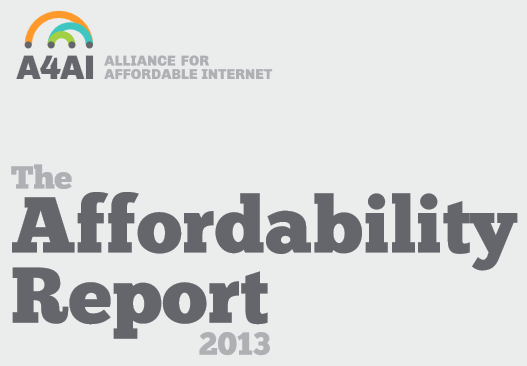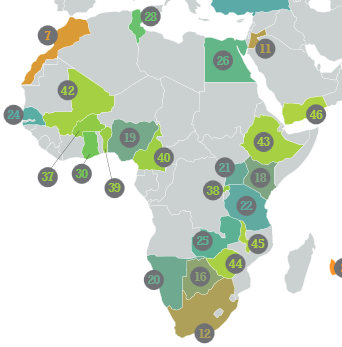Alliance for Affordable Internet Affordability Report highlights successes in Ghana, Kenya, Morocco, Nigeria
The Alliance for Affordable Internet (A4AI), a global coalition working to make broadband affordable for all, has just released “The Affordability Report 2013” (launched by Kenya’s Dr. Bitange Ndemo) which attempts to understand why only some countries have succeeded in creating universal Internet access. The goal is to help other nations catch up as quickly as possible through the recommendation of best stakeholder practices. In total, data in this year’s report covers 46 emerging and developing nations – 22 of which are located in Africa.
The ‘Affordability Index’ ranks countries based on telecoms infrastructure, access to ICT, and Internet affordability indicators. Barriers to affordable Internet are covered as well.
High level findings include:
- Morocco, Kenya, Nigeria, and Uganda are four of the five top developing countries in terms of affordability
- Mauritius is one of the top five emerging countries in terms of affordability
- UN Broadband Commission goals of broadband services priced at less than 5% of monthly income are near-impossible to attain at this time
- Competition does not ensure affordable broadband access in developing countries (policies and regulations to stimulate both supply and demand are needed too)
Barriers to infrastructure creation are many:
- Limited investment in connecting rural areas
- Policies that don’t lower investment risk
- Lack of network resource sharing
- Outdated spectrum policy
- Absence of government subsidies and market incentives
- Insufficient broadband policy
- Scarce demand for services
African Affordability Index 2013 rankings, with anecdotes where provided:
- 2. Mauritius
- 7. Morocco – Strong policies as part of “2013 Digital Morocco”, mobile broadband prices are around 20% of per capita incomes. More than 150,000 teachers have been trained to use digital devices.
- 12. South Africa
- 16. Botswana
- 18. Kenya – An IXP has increased mobile data revenues by upwards of $6 million. Kenya has seen a 90% decline in tariffs since the arrival of four undersea cables in 2009. Demand for mobile services has been stimulated through financial applications like mPesa. In part thanks to mobile money, network operators were able to invest in expanding their networks even further.
- 19. Nigeria – Mobile broadband costs 21% of income at $2 per day. The telecoms regulator has taken steps to eliminate parallel taxes on telecoms infrastructure. A National Broadband Plan outlines how the government will increase broadband penetration 5x to 30% by 2018. Internet usage increased from 24% to 33% between 2010-2012. Smartphones costing under US$30 are desired by 2018.
- 20. Namibia
- 21. Uganda – A competitive market can, in fact, hurt users. Price wars led to lower quality of service which eventually led to tariff increases to generate revenue.
- 22. Tanzania
- 24. Senegal
- 25. Zambia
- 26. Egypt
- 28. Tunisia
- 30. Ghana – International bandwidth rose from 320 Gbps to 12 Tbps from 2010-13. Wholesale broadband costs have declined by as much as 90% since 2006. Mobile broadband penetration rose from 0.24% in 2009 to 33% in 2012. To better connect rural areas, mobile operators have laid terrestrial fibre optic backbone networks. Open access broadband infrastructure is a focus of the government.
- 37. Burkina Faso
- 38. Rwanda – A national 4G network is being funded through a PPP with Korea Telecom and the Government of Rwanda.
- 39. Benin
- 40. Cameroon
- 42. Mali
- 43. Ethiopia – No market competition and limited rural access pose a major challenge.
- 44. Zimbabwe – Some mobile broadband competition, but poor infrastructure expansion and high barriers to investment hurt affordable access. An IXP has actually led to a rare case of duplicating infrastructure and hurting available international bandwidth.
- 45. Malawi
Note: The Affordability Index is comprised of secondary quantitative data with primary data from a multi-country expert survey.














 Twitter
Twitter Facebook
Facebook Pinterest
Pinterest